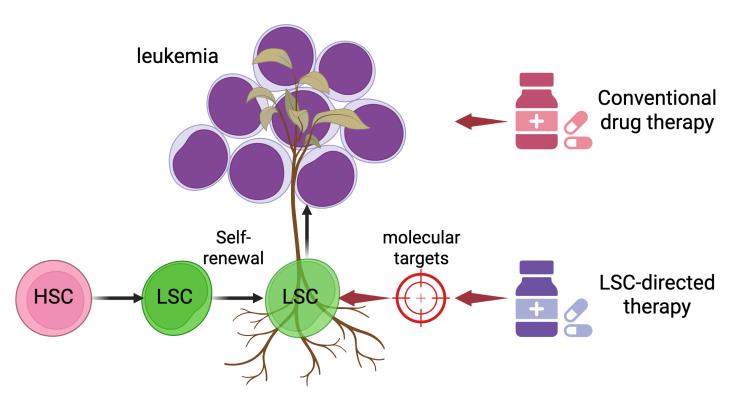About the Lab

The Lacorazza group studies the genetic and epigenetic regulation of normal and leukemic blood cells to identify actionable molecular targets for developing new treatments for high-risk pediatric and adult leukemia patients. Leukemia develops when normal processes that control blood production are corrupted through genetic alterations, leading to the uncontrolled proliferation of lymphoid or myeloid cells. Conventional treatments effectively target bulk leukemia but often spare a small population of leukemic cells, known as leukemia stem cells (LSCs), which possess regenerative capacity and can cause relapses (Figure 1). Therefore, LSCs are a promising target for therapy aimed at curing leukemia at its source.
Lacorazza lab focuses on a core question: how can we eliminate leukemia without damaging the healthy blood and immune systems? To answer this, we examine how hematopoietic stem cells produce the various blood cells, including those of the immune system, and how this carefully balanced process can go wrong in disease. Using interdisciplinary methods, we aim to uncover molecular vulnerabilities in leukemia that can be selectively targeted with precision therapies. These projects provide an exciting opportunity for students and trainees to engage in high-impact translational research at the intersection of stem cell biology, mouse models of leukemia, molecular mechanisms of blood cancer, reconstitution of blood and immune cells, and clinical translation.
Current Projects
- Transcriptional Regulation of Hematopoietic Stem Cells and Immune Cells
- Genetic and Epigenetic Regulation in Lymphoid and Myeloid Leukemias
- Targeting Relapsed Pediatric Leukemia
- Targeting Leukemia Stem Cells
Joint Institutions
Dr. Daniel Lacorazza is a professor of Pathology and Immunology at Baylor College of Medicine and principal investigator in the Experimental Immunology & Hematology Laboratory at Texas Children’s Hospital.
Learning to stop cancer at its roots
The Lacorazza lab works with mouse models to study the leukemia stem cell population in chronic myeloid leukemia. Specifically, we have investigated the role KLF4 plays on leukemia stem cell self-renewal.











